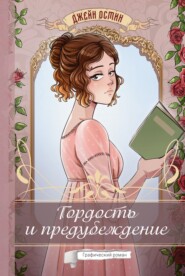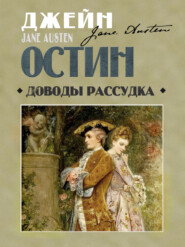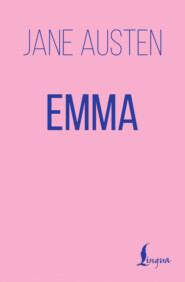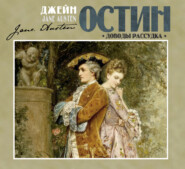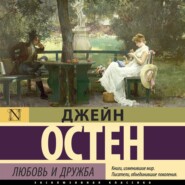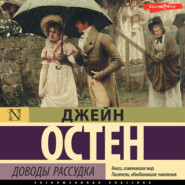По всем вопросам обращайтесь на: info@litportal.ru
(©) 2003-2025.
✖
Emma
Настройки чтения
Размер шрифта
Высота строк
Поля
‘You understand the force of influence pretty well, Harriet; but I would have you so firmly established in good society, as to be independent even of Hartfield and Miss Woodhouse. I want to see you permanently well connected, and to that end it will be advisable to have as few odd acquaintance as may be; and, therefore, I say that if you should still be in this country when Mr Martin marries, I wish you may not be drawn in by your intimacy with the sisters, to be acquainted with the wife, who will probably be some mere farmer’s daughter, without education.’
‘To be sure. Yes. Not that I think Mr Martin would ever marry any body but what had had some education – and been very well brought up. However, I do not mean to set up my opinion against yours – and I am sure I shall not wish for the acquaintance of his wife. I shall always have a great regard for the Miss Martins, especially Elizabeth, and should be very sorry to give them up, for they are quite as well educated as me. But if he marries a very ignorant, vulgar woman, certainly I had better not visit her, if I can help it.’
Emma watched her through the fluctuations of this speech, and saw no alarming symptoms of love. The young man had been the first admirer, but she trusted there was no other hold, and that there would be no serious difficulty, on Harriet’s side, to oppose any friendly arrangement of her own.
They met Mr Martin the very next day, as they were walking on the Donwell road. He was on foot, and after looking very respectfully at her, looked with most unfeigned satisfaction at her companion. Emma was not sorry to have such an opportunity of survey; and walking a few yards forward, while they talked together, soon made her quick eye sufficiently acquainted with Mr Robert Martin. His appearance was very neat, and he looked like a sensible young man, but his person had no other advantage; and when he came to be contrasted with gentlemen, she thought he must lose all the ground he had gained in Harriet’s inclination. Harriet was not insensible of manner; she had voluntarily noticed her father’s gentleness with admiration as well as wonder. Mr Martin looked as if he did not know what manner was.
They remained but a few minutes together, as Miss Woodhouse must not be kept waiting; and Harriet then came running to her with a smiling face, and in a flutter of spirits, which Miss Woodhouse hoped very soon to compose.
‘Only think of our happening to meet him! – How very odd! It was quite a chance, he said, that he had not gone round by Randalls. He did not think we ever walked this road. He thought we walked towards Randalls most days. He has not been able to get the Romance of the Forest yet. He was so busy the last time he was at Kingston that he quite forgot it, but he goes again tomorrow. So very odd we should happen to meet! Well, Miss Woodhouse, is he like what you expected? What do you think of him? Do you think him so very plain?’
‘He is very plain, undoubtedly – remarkably plain: – but that is nothing compared with his entire want of gentility. I had no right to expect much, and I did not expect much; but I had no idea that he could be so very clownish, so totally without air. I had imagined him, I confess, a degree or two nearer gentility.’
‘To be sure,’ said Harriet, in a mortified voice, ‘he is not so genteel as real gentlemen.’
‘I think, Harriet, since your acquaintance with us, you have been repeatedly in the company of some, such very real gentlemen, that you must yourself be struck with the difference in Mr Martin. At Hartfield, you have had very good specimens of well educated, well bred men. I should be surprized if, after seeing them, you could be in company with Mr Martin again without perceiving him to be a very inferior creature – and rather wondering at yourself for having ever thought him at all agreeable before. Do not you begin to feel that now? Were not you struck? I am sure you must have been struck by his awkward look and abrupt manner, and the uncouthness of a voice which I heard to be wholly unmodulated as I stood here.’
‘Certainly, he is not like Mr Knightley. He has not such a fine air and way of walking as Mr Knightley. I see the difference plain enough. But Mr Knightley is so very fine a man!’
‘Mr Knightley’s air is so remarkably good that it is not fair to compare Mr Martin with him. You might not see one in a hundred with gentleman so plainly written as in Mr Knightley. But he is not the only gentleman you have been lately used to. What say you to Mr Weston and Mr Elton? Compare Mr Martin with either of them. Compare their manner of carrying themselves; of walking; of speaking; of being silent. You must see the difference.’
‘Oh yes! – there is a great difference. But Mr Weston is almost an old man. Mr Weston must be between forty and fifty.’
‘Which makes his good manners the more valuable. The older a person grows, Harriet, the more important it is that their manners should not be bad; the more glaring and disgusting any loudness, or coarseness, or awkwardness becomes. What is passable in youth is detestable in later age. Mr Martin is now awkward and abrupt; what will he be at Mr Weston’s time of life?’
‘There is no saying, indeed,’ replied Harriet rather solemnly.
‘But there may be pretty good guessing. He will be a completely gross, vulgar farmer, totally inattentive to appearances, and thinking of nothing but profit and loss.’
‘Will he, indeed? That will be very bad.’
‘How much his business engrosses him already is very plain from the circumstance of his forgetting to inquire for the book you recommended. He was a great deal too full of the market to think of any thing else – which is just as it should be, for a thriving man. What has he to do with books? And I have no doubt that he will thrive, and be a very rich man in time – and his being illiterate and coarse need not disturb us.’
‘I wonder he did not remember the book’ – was all Harriet’s answer, and spoken with a degree of grave displeasure which Emma thought might be safely left to itself. She, therefore, said no more for some time. Her next beginning was,
‘In one respect, perhaps, Mr Elton’s manners are superior to Mr Knightley’s or Mr Weston’s. They have more gentleness. They might be more safely held up as a pattern. There is an openness, a quickness, almost a bluntness in Mr Weston, which every body likes in him, because there is so much good-humour with it – but that would not do to be copied. Neither would Mr Knightley’s downright, decided, commanding sort of manner, though it suits him very well; his figure, and look, and situation in life seem to allow it; but if any young man were to set about copying him, he would not be sufferable. On the contrary, I think a young man might be very safely recommended to take Mr Elton as a model. Mr Elton is good-humoured, cheerful, obliging, and gentle. He seems to me to be grown particularly gentle of late. I do not know whether he has any design of ingratiating himself with either of us, Harriet, by additional softness, but it strikes me that his manners are softer than they used to be. If he means any thing, it must be to please you. Did not I tell you what he said of you the other day?’
She then repeated some warm personal praise which she had drawn from Mr Elton, and now did full justice to; and Harriet blushed and smiled, and said she had always thought Mr Elton very agreeable.
Mr Elton was the very person fixed on by Emma for driving the young farmer out of Harriet’s head. She thought it would be an excellent match; and only too palpably desirable, natural, and probable, for her to have much merit in planning it. She feared it was what every body else must think of and predict. It was not likely, however, that any body should have equalled her in the date of the plan, as it had entered her brain during the very first evening of Harriet’s coming to Hartfield. The longer she considered it, the greater was her sense of its expediency. Mr Elton’s situation was most suitable, quite the gentleman himself, and without low connexions; at the same time, not of any family that could fairly object to the doubtful birth of Harriet. He had a comfortable home for her, and Emma imagined a very sufficient income; for though the vicarage of Highbury was not large, he was known to have some independent property; and she thought very highly of him as a good-humoured, well-meaning, respectable young man, without any deficiency of useful understanding or knowledge of the world.
She had already satisfied herself that he thought Harriet a beautiful girl, which she trusted, with such frequent meetings at Hartfield, was foundation enough on his side; and on Harriet’s there could be little doubt that the idea of being preferred by him would have all the usual weight and efficacy. And he was really a very pleasing young man, a young man whom any woman not fastidious might like. He was reckoned very handsome; his person much admired in general, though not by her, there being a want of elegance of feature which she could not dispense with: – but the girl who could be gratified by a Robert Martin’s riding about the country to get walnuts for her might very well be conquered by Mr Elton’s admiration.
CHAPTER 5 (#ulink_492ec93f-0e3d-5a30-bad7-d4c06f50dd14)
‘I do not know what your opinion may be, Mrs Weston,’ said Mr Knightley, ‘of this great intimacy between Emma and Harriet Smith, but I think it a bad thing.’
‘A bad thing! Do you really think it a bad thing? – why so?’
‘I think they will neither of them do the other any good.’
‘You surprize me! Emma must do Harriet good: and by supplying her with a new object of interest, Harriet may be said to do Emma good. I have been seeing their intimacy with the greatest pleasure. How very differently we feel! – Not think they will do each other any good! This will certainly be the beginning of one of our quarrels about Emma, Mr Knightley.’
‘Perhaps you think I am come on purpose to quarrel with you, knowing Weston to be out, and that you must still fight your own battle.’
‘Mr Weston would undoubtedly support me, if he were here, for he thinks exactly as I do on the subject. We were speaking of it only yesterday, and agreeing how fortunate it was for Emma, that there should be such a girl in Highbury for her to associate with. Mr Knightley, I shall not allow you to be a fair judge in this case. You are so much used to live alone, that you do not know the value of a companion; and perhaps no man can be a good judge of the comfort a woman feels in the society of one of her own sex, after being used to it all her life. I can imagine your objection to Harriet Smith. She is not the superior young woman which Emma’s friend ought to be. But on the other hand, as Emma wants to see her better informed, it will be an inducement to her to read more herself. They will read together. She means it, I know.’
‘Emma has been meaning to read more ever since she was twelve years old. I have seen a great many lists of her drawing-up at various times of books that she meant to read regularly through – and very good lists they were – very well chosen, and very neatly arranged – sometimes alphabetically, and sometimes by some other rule. The list she drew up when only fourteen – I remember thinking it did her judgment so much credit, that I preserved it some time; and I dare say she may have made out a very good list now. But I have done with expecting any course of steady reading from Emma. She will never submit to any thing requiring industry and patience, and a subjection of the fancy to the understanding. Where Miss Taylor failed to stimulate, I may safely affirm that Harriet Smith will do nothing. – You could never persuade her to read half so much as you wished. – You know you could not.’
‘I dare say,’ replied Mrs Weston, smiling, ‘that I thought so then; – but since we have parted, I can never remember Emma’s omitting to do any thing I wished.’
‘There is hardly any desiring to refresh such a memory as that,’ – said Mr Knightley, feelingly; and for a moment or two he had done. ‘But I,’ he soon added, ‘who have had no such charm thrown over my senses, must still see, hear, and remember. Emma is spoiled by being the cleverest of her family. At ten years old, she had the misfortune of being able to answer questions which puzzled her sister at seventeen. She was always quick and assured: Isabella slow and diffident. And ever since she was twelve, Emma has been mistress of the house and of you all. In her mother she lost the only person able to cope with her. She inherits her mother’s talents, and must have been under subjection to her.’
‘I should have been sorry, Mr Knightley, to be dependent on your recommendation, had I quitted Mr Woodhouse’s family and wanted another situation; I do not think you would have spoken a good word for me to any body. I am sure you always thought me unfit for the office I held.’
‘Yes,’ said he, smiling. ‘You are better placed here; very fit for a wife, but not at all for a governess. But you were preparing yourself to be an excellent wife all the time you were at Hartfield. You might not give Emma such a complete education as your powers would seem to promise; but you were receiving a very good education from her, on the very material matrimonial point of submitting your own will, and doing as you were bid; and if Weston had asked me to recommend him a wife, I should certainly have named Miss Taylor.’
‘Thank you. There will be very little merit in making a good wife to such a man as Mr Weston.’
‘Why, to own the truth, I am afraid you are rather thrown away, and that with every disposition to bear, there will be nothing to be borne. We will not despair, however. Weston may grow cross from the wantonness of comfort, or his son may plague him.’
‘I hope not that. – It is not likely. No, Mr Knightley, do not foretell vexation from that quarter.’
‘Not I, indeed. I only name possibilities. I do not pretend to Emma’s genius for foretelling and guessing. I hope, with all my heart, the young man may be a Weston in merit, and a Churchill in fortune. – But Harriet Smith – I have not half done about Harriet Smith. I think her the very worst sort of companion that Emma could possibly have. She knows nothing herself, and looks upon Emma as knowing every thing. She is a flatterer in all her ways; and so much the worse, because undesigned. Her ignorance is hourly flattery. How can Emma imagine she has any thing to learn herself, while Harriet is presenting such a delightful inferiority? And as for Harriet, I will venture to say that she cannot gain by the acquaintance. Hartfield will only put her out of conceit with all the other places she belongs to. She will grow just refined enough to be uncomfortable with those among whom birth and circumstances have placed her home. I am much mistaken if Emma’s doctrines give any strength of mind, or tend at all to make a girl adapt herself rationally to the varieties of her situation in life. – They only give a little polish.’
‘I either depend more upon Emma’s good sense than you do, or am more anxious for her present comfort; for I cannot lament the acquaintance. How well she looked last night!’
‘Oh! you would rather talk of her person than her mind, would you? Very well; I shall not attempt to deny Emma’s being pretty.’
‘Pretty! say beautiful rather. Can you imagine any thing nearer perfect beauty than Emma altogether – face and figure?’
‘I do not know what I could imagine, but I confess that I have seldom seen a face or figure more pleasing to me than hers. But I am a partial old friend.’
‘Such an eye! – the true hazel eye – and so brilliant! regular features, open countenance, with a complexion! oh! what a bloom of full health, and such a pretty height and size; such a firm and upright figure! There is health, not merely in her bloom, but in her air, her head, her glance. One hears sometimes of a child being “the picture of health;” now, Emma always gives me the idea of being the complete picture of grown-up health. She is loveliness itself. Mr Knightley, is not she?’
‘I have not a fault to find with her person,’ he replied. ‘I think her all you describe. I love to look at her; and I will add this praise, that I do not think her personally vain. Considering how very handsome she is, she appears to be little occupied with it; her vanity lies another way. Mrs Weston, I am not to be talked out of my dislike of Harriet Smith, or my dread of its doing them both harm.’
‘And I, Mr Knightley, am equally stout in my confidence of its not doing them any harm. With all dear Emma’s little faults, she is an excellent creature. Where shall we see a better daughter, or a kinder sister, or a truer friend? No, no; she has qualities which may be trusted; she will never lead any one really wrong; she will make no lasting blunder; where Emma errs once, she is in the right a hundred times.’
‘Very well; I will not plague you any more. Emma shall be an angel, and I will keep my spleen to myself till Christmas brings John and Isabella. John loves Emma with a reasonable and therefore not a blind affection, and Isabella always thinks as he does; except when he is not quite frightened enough about the children. I am sure of having their opinions with me.’
‘I know that you all love her really too well to be unjust or unkind; but excuse me, Mr Knightley, if I take the liberty (I consider myself, you know, as having somewhat of the privilege of speech that Emma’s mother might have had) the liberty of hinting that I do not think any possible good can arise from Harriet Smith’s intimacy being made a matter of much discussion among you. Pray excuse me; but supposing any little inconvenience may be apprehended from the intimacy, it cannot be expected that Emma, accountable to nobody but her father, who perfectly approves the acquaintance, should put an end to it, so long as it is a source of pleasure to herself. It has been so many years my province to give advice, that you cannot be surprized, Mr Knightley, at this little remains of office.’
‘Not at all,’ cried he; ‘I am much obliged to you for it. It is very good advice, and it shall have a better fate than your advice has often found; for it shall be attended to.’
‘Mrs John Knightley is easily alarmed, and might be made unhappy about her sister.’
‘Be satisfied,’ said he, ‘I will not raise any outcry. I will keep my ill-humour to myself. I have a very sincere interest in Emma. Isabella does not seem more my sister; has never excited a greater interest; perhaps hardly so great. There is an anxiety, a curiosity in what one feels for Emma. I wonder what will become of her!’






